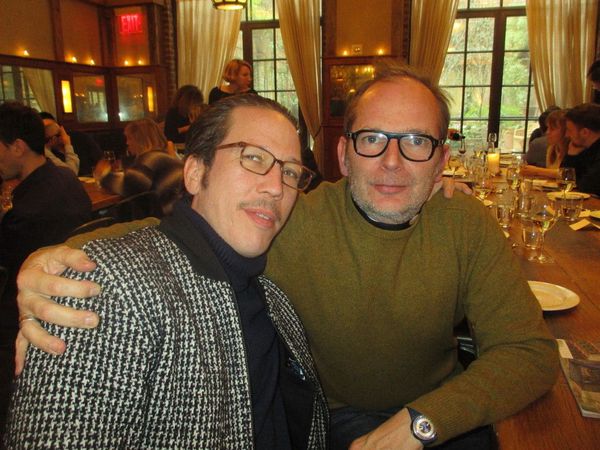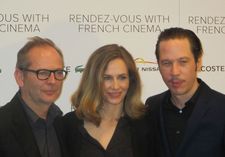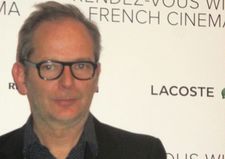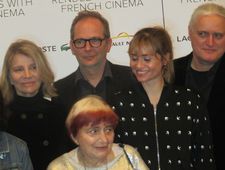 |
| At lunch with Reda Kateb, who plays Django Reinhardt in Étienne Comar's Django Photo: Anne-Katrin Titze |
Étienne Comar's (co-screenwriter of Xavier Beauvois' Of Gods And Men, producer of Abderrahmane Sissako's Timbuktu) directorial debut, Django, starring Reda Kateb and Cécile de France with Alex Brendemühl (who is also in Nicole Garcia's Mal De Pierres), was the opening night film of the Rendez-Vous with French Cinema in New York.
Django (not to be confused with Quentin Tarantino's Django Unchained, which starred Jamie Foxx, Leonardo DiCaprio and Christoph Waltz, or Franco Nero's Django films) is based on the novel by Alexis Salatko, with a score by longtime Nick Cave collaborator Warren Ellis, costumes by Pascaline Chavanne, and shot by Christophe Beaucarne on the life of jazz guitarist Django Reinhardt.
 |
| Étienne Comar with Cécile de France and Reda Kateb Photo: Anne-Katrin Titze |
Étienne brought up Madeline Fontaine, the costume designer for Pablo Larraín's Jackie when I was seated next to him at the Locanda Verde lunch hosted by uniFrance. She won a BAFTA and received an Oscar nomination for Jackie.
Anne-Katrin Titze: You decided to work with Warren Ellis on Django. How did that come about?
Étienne Comar: It's because he made a few times different music for films. And Reda Kateb knew him because he worked with him [on David Oelhoffen's Loin Des Hommes]. And I was looking for somebody who had the possibility to recreate a piece of music that Django made which had disappeared.
AKT: That was the one played during the liberation in 1945?
EC: Exactly, exactly. We just have a few notes about this composition and I asked Warren to recreate with his own inspiration - not the style of Django, but his own vision of what could be this piece of music. So I was very interested to work with him because he came from the rock 'n' roll, from symphonic music and he was absolutely happy to have this challenge and he created something, I think, quite beautiful with organ, chords and strings.
AKT: I was very surprised seeing his name in the credits after seeing the film. So Goebbels invited Django to play in Berlin?
EC: Yes.
AKT: Did you ever imagine what would have happened had he gone?
EC: Yes, I have imagined it. Thankfully, he had not been there. It was very surprising when we went to Berlin for the opening and the competition in Berlin for the film. To be there 70 years after and to present our movie - it was something quite moving. To see Django play now in front of the Germans 70 years later. It was like a reconciliation moment, very, very strong.
AKT: You made an interesting choice for the beginning of your film. The scene in the forest leaves the audience lost at first. We don't know who the people are or what is going on.
EC: It says it is the Ardennes. We know we are in the forest. We know we are in '43. We don't know exactly who it is. It's more, you know, like a symbolic scene. An opening scene in music about what's going to be the film after that. The main character in this scene is blind. He plays music and he doesn't want to see exactly what's going to happen. So I think it's a metaphor of what Django is in the first part of the film after that.
AKT: The feel of the scene is strangely of the present as well - despite the fact that you inform us it is 1943. Can you talk about the casting a bit? It might have something to do with it. Django's mother feels very authentic. Is she Romani?
 |
| Étienne Comar on Warren Ellis: "He was absolutely happy to have this challenge ..." Photo: Anne-Katrin Titze |
EC: She is a gypsy, a real gypsy. And she is a musician, a dancer. She is a great woman, very close to the character of Django's mother. It was very important to me to have some real gypsies to have this community in the film. Reda learned a bit how to speak the words. It was very important to us, this kind of documentary feeling when you saw them.
Read what Cécile de France had to say on playing with Reda Kateb, costume designer Pascaline Chavanne, Man Ray's muse Lee Miller as the inspiration for her character and Django Reinhardt.
Coming up - Django star Reda Kateb at the Locanda Verde uniFrance lunch celebrating Rendez-Vous with French Cinema in New York.
The uniFrance and Film Society of Lincoln Center's 22nd edition of Rendez-Vous with French Cinema in New York, runs through March 12. Screenings will take place at the Walter Reade Theater, Lincoln Center.






















